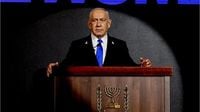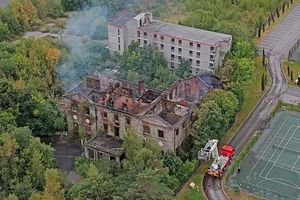On August 20, 2025, a diplomatic firestorm erupted between Israel and France, as Israeli Prime Minister Benjamin Netanyahu publicly accused French President Emmanuel Macron of fueling antisemitism by recognizing Palestinian statehood. The charge, made in a sharply worded letter and echoed in Netanyahu’s public statements, has reignited a fierce debate over the roots of rising antisemitic violence in France and the broader implications of Western recognition of Palestinian statehood.
According to reporting from The Algemeiner, Netanyahu’s letter to Macron did not mince words. He wrote, “Your call for a Palestinian state pours fuel on this antisemitic fire.” Netanyahu argued that France’s move was not an act of diplomacy but “appeasement,” warning that it “rewards Hamas terror, hardens Hamas’s refusal to free the hostages, emboldens those who menace French Jews, and encourages the Jew-hatred now stalking your streets.” He pressed Macron to act decisively by the Jewish New Year, September 23, 2025, declaring, “History will not forgive hesitation. It will honor action.”
Macron’s office was quick to hit back, releasing a statement on August 20 that rejected Netanyahu’s analysis as “erroneous, abject, and will not go unanswered.” The French presidency insisted that “the current period calls for seriousness and responsibility, not generalization and manipulation.” The statement continued, “Violence against the Jewish community is unacceptable,” and called on all local and regional governments in France to “take the strongest possible action against the perpetrators of antisemitic acts.”
This exchange comes against the backdrop of a troubling surge in antisemitic incidents in France, particularly since the Hamas-led attack on Israel on October 7, 2023, and the subsequent war in Gaza. The Representative Council of Jewish Institutions of France (CRIF), the nation’s main Jewish representative body, reported a total of 1,570 antisemitic outrages in 2024—a slight decrease from 2023’s record of 1,676, but still dramatically higher than the 436 acts recorded in 2022. As The Algemeiner notes, this rise has been accompanied by a parallel increase in anti-Israel sentiment, complicating the social and political landscape for French Jews.
Netanyahu’s letter drew on this context, warning Macron, “Antisemitism is a cancer. It spreads when leaders stay silent. It retreats when leaders act. I call upon you to replace weakness with action, appeasement with resolve, and to do so by a clear date: the Jewish New Year, Sept. 23, 2025.” He also cited the actions of the U.S. president, stating, “As [US President Donald] Trump has shown, antisemitism can and must be confronted. The president is protecting the civil rights of American Jews, enforcing the law, protecting public order and prosecuting antisemitic crimes. He has deported Hamas sympathizers and revoked the visas of foreign students who incite violence against Jews.”
Macron’s decision to recognize a Palestinian state, announced in late July and slated for formalization at the United Nations General Assembly in September, was framed as part of France’s “commitment to a just and lasting peace in the Middle East.” This move placed France alongside Canada, the United Kingdom, and Australia, which all announced similar plans in the days that followed. The move was welcomed by the Palestinian terrorist group Hamas, whose senior official Ghazi Hamad described the Western recognition as “the fruits of Oct. 7,” directly linking the massacre in southern Israel to increased Western support for Palestinian statehood.
Netanyahu’s criticism went further, asserting that Macron’s policy would embolden Hamas and harden its refusal to release Israeli hostages. He argued that such recognition “encourages the Jew-hatred now stalking your streets,” a reference to the wave of antisemitic acts that have plagued France in recent years.
French officials, however, have firmly rejected the suggestion that their foreign policy decisions are to blame for antisemitic violence. Benjamin Haddad, France’s Minister Delegate for European Affairs, stated, “France has no lessons to learn in the fight against antisemitism.” This sentiment was echoed in Macron’s own social media response after a recent incident in which vandals targeted a tree planted in memory of Ilan Halimi, a French Jew kidnapped and murdered in 2006. “Cutting down the tree honoring Ilan Halimi is an attempt to kill him a second time. It will not succeed: the Nation will not forget this child of France who died because he was Jewish,” Macron posted on X (formerly Twitter). “All means are being deployed to punish this act of hatred. In the face of antisemitism: the Republic, always uncompromising.”
The debate over causality—whether France’s recognition of a Palestinian state has fueled antisemitism—has also attracted academic scrutiny. On March 13, the Institute for the Study of Global Antisemitism and Policy published an analysis by historian Marc Knobel, a researcher at the Jonathas Institute in Brussels and author of Cyberhate: Propaganda and Antisemitism on the Internet. Knobel observed, “A recurring correlation emerges between peaks in antisemitic acts in France and periods of tension in the Middle East, particularly visible in the years 2000, 2002, 2004, 2009, 2012, 2014, 2019, 2023, and 2024.” For 2025, he noted, “What stands out is the prevalence of antisemitism linked to the conflict between Israel and Hamas.” However, Knobel cautioned that “it is essential that politicians are aware of the impact of their words on the Israeli-Palestinian conflict; irresponsible and violent speeches by the radical left can exacerbate tensions and fuel antisemitism in our country.”
Recent incidents underscore the fraught climate. On August 7, employees of Israeli airline El Al discovered red paint and graffiti bearing slogans like “Palestine will live, Palestine will win,” and “Genocidal airline El Al” at their Paris office. The airline responded by pulling all staff from France and issuing a statement: “El Al takes the incident very seriously and is actively cooperating with the authorities, adhering to the guidance of officials in both France and Israel. The airline proudly displays the Israeli flag on its planes and strongly condemns all forms of violence, particularly antisemitism.”
This latest spat between Netanyahu and Macron is just the tip of the iceberg in a complex web of historical grievances, political calculations, and deeply held fears. France’s Jewish community finds itself caught between rising antisemitic hostility and a polarized debate over the Middle East. Meanwhile, government officials on both sides remain adamant in their positions, each insisting on their commitment to combating antisemitism, but deeply divided on the best path forward.
As the Jewish New Year approaches, all eyes will be on France’s next moves—both in its domestic response to antisemitism and in its international stance on the Israeli-Palestinian conflict. The stakes, for many, could not feel higher.





